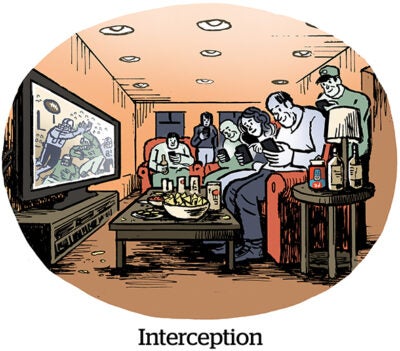Here’s today’s AdExchanger.com news round-up… Want it by email? Sign up here.
The Services Company
What do Apple’s prices indicate about its Services revenue plans?
A lot, actually.
Apple’s MO has been to increase customer lifetime value by increasing devices and prices. Apple made a brief run at the lower market with the 5C, a phone released in 2013 and discontinued in 2014. Instead, it raced up-market with phones that cost hundreds of dollars more each version.
So it’s notable that despite the eye-popping lineup of the new Apple Watch, iPhone and AirPods this week, all prices remain the same. Considering high inflation, they could be considered cheaper, notes Ben Thompson at Stratechery.
But Apple is moving down the Services track, like how smart-TV manufacturers drive down prices by extracting revenue over time from data, ads and third-party apps.
“It has been disconcerting for people who think of Apple as a product company to see the company fight so fiercely for its App Store model, and to see the way it is willing to approach if not cross the line of anticompetitive behavior when it comes to App Tracking Transparency and its clear ambitions in the advertising space,” Thompson writes.
“Here’s hoping that the products that made the company great don’t suffer from what is, at this point, a clear shift in strategy.”
The Enter-Prize Deal
NBC and Salesforce signed a deal to co-produce a docuseries for the linear CNBC network, Axios reports.
I hear what you’re saying, and we’re going to resist making this a Salesforce+ joke.
What’s actually interesting about the deal is that it’s part of a trend toward much larger marketing arrangements built around TV advertising (or, in Google’s case, around YouTube, ad tech and the cloud business).
Last year, Salesforce and NBC signed a seven-year deal making the software company a Team USA and Olympics sponsor, on top of guaranteed minimum ad commitments. The NBCU ads group is also a blue-chip B2B client of the Salesforce CRM.
“We have spent more and more time with these larger – what we call ‘enterprise deals,'” says Mark Marshall, NBCU’s president of advertising and client partnerships.
Another example is Toyota. The car maker is another title sponsor for Team USA and the Olympics. And a sponsor of NBC’s Sunday Night NFL package, with a branded segment called the Toyota Halftime Report. And after CNBC picked up distribution for an annual game between two historically black colleges or universities (HBCUs) this year, it was branded The Toyota HBCU New York Football Classic.
News It Or Lose It
The streaming advertising industry has been on a hockey-stick growth trajectory, but it’s still missing one of the major pillars of linear TV ad revenue: the news.
Netflix, Prime and Disney+, the big three streaming apps not counting YouTube, fend off live news with a 10-foot pole. But the trend is reversing somewhat.
The latest counterexample is Spectrum, which just launched a CTV app with 30 local news networks.
Spectrum is one wave in a potential tide of streaming TV news options. Video on-demand platforms like Tubi are squeezing local news into their content libraries through free, ad-supported TV (FAST) channels, while tech companies like VUit help broadcasters create FAST channels out of thin air expressly for streaming.
The CTV rush in the news biz makes sense, considering print journalism and legacy TV are on the decline.
Newspapers are shutting their doors at the same pandemic pace, hybrid publishers like DotDash Meredith are canceling print editions left and right, and streaming viewership surpassed cable for the first time this summer.
Expect the FAST channel trend to keep chugging along for the foreseeable future.
But Wait, There’s More!
Next up to cut the TV cord: Political campaigns. [Protocol]
The UK Information Commissioner publishes guidance on privacy enhancing technologies. [blog]
Camelot is the first agency in the Roku certification program to use OneView (formerly dataxu) to help SMBs. [release]
Mobile gaming engine Unity selects Media.Monks as its first media AOR. [Campaign]
IronSource pushes back shareholder vote on Unity sale to Oct. 7. [Seeking Alpha]
Spotify is about to dip a toe into audiobooks. [TechCrunch]
You’re Hired!
LG Ads Solutions poaches Tony Marlow from IAS, Ed Wale from Magnite and Barbie Brewer from mParticle. [release]
Vibenomics introduces Sarah Jacobs as SVP of ad sales. [release]
Crossing Minds hires Ching-Wei Chen as VP of engineering. [release]
















